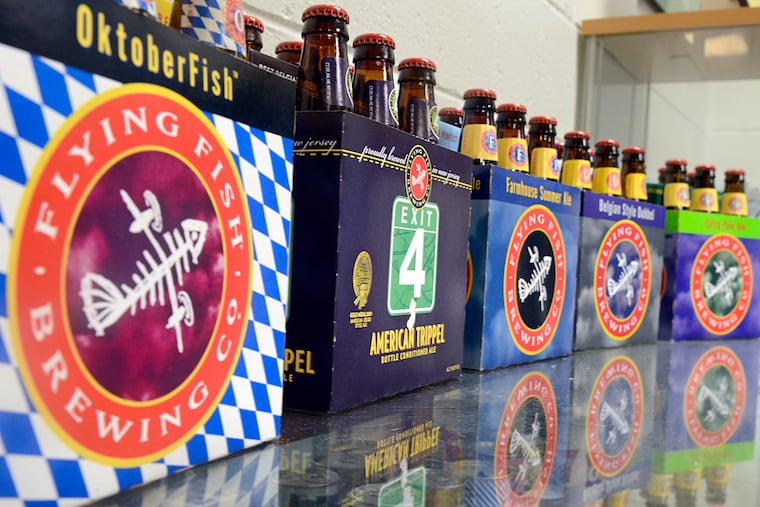Cape May Brewing plans to acquire Flying Fish, uniting two South Jersey breweries
Both breweries have contended to be the state's largest brewery at different times. Now it will be a sure thing.

Two storied New Jersey craft breweries will soon fall under the same ownership.
Cape May Brewing Co. announced Monday that it will acquire Flying Fish Brewing Co., one of the state’s first craft breweries. Cape May co-owner Ryan Krill said both brands will carry on.
“The brand and legacy of Flying Fish will continue,” Krill said. “As a consumer, it’s gonna feel and look the same.”
Krill declined to comment on how much Cape May will pay for Flying Fish’s assets, including its production facility in Somerdale, Camden County, and its 28-year-old brand. Its beer garden at Camden’s Adventure Aquarium will continue to operate as usual.
This isn’t the first time Flying Fish has changed hands: It was acquired by Scranton-based investment firm Elk Lake Capital in 2016.
Founded by Gene Muller in 1995 as a “virtual brewery,” Flying Fish is arguably the oldest craft brewery in New Jersey. It opened a brewery and taproom in Cherry Hill in 1996.
In 2012, it moved operations to the Somerdale facility, which has the capacity to brew 150,000 barrels per year, according to Elk Lake Capital’s website. By 2016, Flying Fish had become the largest brewer in New Jersey — a distinction Cape May Brewing has laid claim to in recent years.
According to Cape May’s marketing team, Flying Fish produced roughly 16,000 barrels in 2022. Cape May produced more than 42,000 barrels.
Krill said Flying Fish currently has about 20 employees, not including part-time staffers at its tasting room. They will join Cape May’s 130-person workforce, split between the brewery and Cape Beverage, its Egg Harbor Township-based distributor business, launched in 2019.
Cape May Brewing was founded in 2011 by Krill, his father, Bob, and friend Chris Henke, who hedged their bets when they signed a one-year lease on a 1,500-square-foot space on the grounds of the Cape May Airport.
“Our vision was that it wasn’t going to work out,” Krill remembers. “We never could have imagined that Cape May would turn into what it has.”
While the brewery started out making 12-gallon batches, by 2015, Krill and his co-founders invested in a 30-barrel brewhouse that was projected to increase their production to 15,000 barrels a year. It’s also diversified its lineup to include hard seltzers, lemonades, and teas (including Wawa collaboration “Shore Tea”).
In the last five years, demand has exceeded capacity, prompting Cape May to contract-brew with Yards beginning in 2019. That arrangement will stay in place in the short-term while Cape May assesses next steps. “Our long-term goal is to bring it in house,” Krill said.
Cape May is still in the due-diligence phase of acquiring Flying Fish, so Krill is unsure yet whether they’ll be able to serve Flying Fish brews at Cape May’s tasting room and vice versa.
“The laws in New Jersey are just as wonky as every other state, so that’s up to regulatory approval,” he said. “This is all very, very new. We’re still working through what the experience is going to be in the tasting room.”
Acquisitions roiled the beer industry in the last decade, with gargantuan makers like AB InBev snapping up high-profile craft brands. This deal has a different flavor to it.
“We want to stay independent and true to our roots,” Krill said. “It’s about really putting New Jersey on the map for craft beer.”